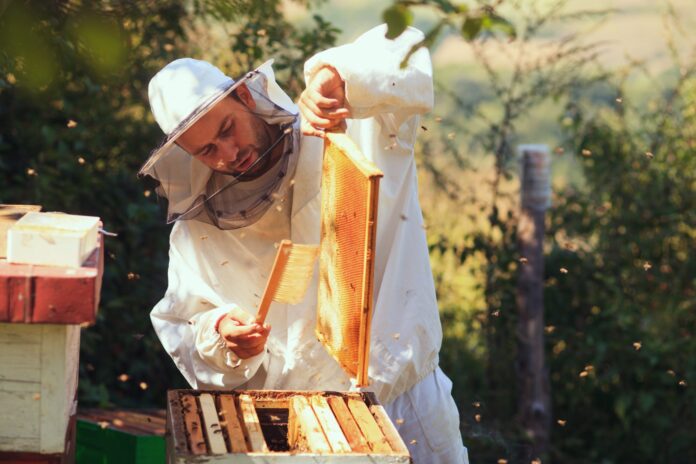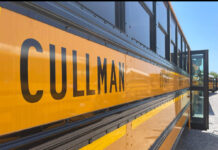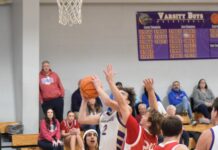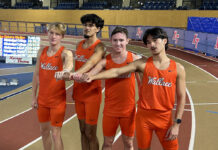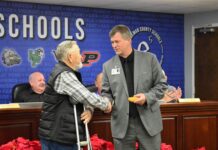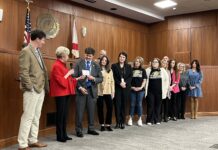The 26th annual Alabama Beekeeping Symposium is going digital! Because of current COVID-19 restrictions, participants will be able to attend this year’s symposium from the comfort of their own homes.
What to expect
The symposium is a two-day online event, running Feb. 6-7. There is a $20 fee to attend. The symposium includes many presentations that deal with the latest information on sound beekeeping practices. This year, the symposium will focus on two presentation tracks: Products from The Hive and Hive Maintenance. The sessions under the Products from The Hive track will provide information to help beekeepers expand their product lines beyond honey. The Hive Maintenance track will feature updated best management practices from experienced beekeepers and research scientists.
Saturday, Feb. 6 agenda
Joint Session
- 8:25 a.m. – Welcome
- William Rowe, regional agent – Alabama Cooperative Extension System
- 8:30 a.m. – Beekeeping Down Under
- Raffaele Dall’Olio, beekeeping and honey specialist – Food and Agriculture Organization of the United Nations
After the joint session, participants can choose which breakout sessions they would like to attend. They can either choose to attend all the sessions from one particular track or pick and choose sessions from both tracks.
Products from the Hive
- 9:30 a.m. – Vendor
- 9:35 a.m. – Skin Cream and Lotion Bars Using Beeswax
- Kathy Coleman, co-owner of Eclectic Bee Farm
- 10:05 a.m. – Break
- 10:15 a.m. – Vendor
- 10:20 a.m. – What’cha Bakin’ Honey?
- Ana Plana, chef and lecturer – Auburn University
- 10:50 a.m. – Vendor
- 10:55 a.m. – Lip Balm and Perfume Sticks Using Beeswax
- Kathy Coleman, co-owner of Eclectic Bee Farm
- 11:25 a.m. – Vendor
- 11:30 a.m. – Marketing for Small-Scale Beekeepers
- Jessie Boswell, regional agent – Alabama Cooperative Extension System
- Noon – Vendor
- 12:05 p.m. – Bottling Honey for Sale and Show
- Sandy Good, Journey to Mastery
- 12:35 p.m. – Survey
Hive Maintenance
- 9:30 a.m. – Vendor
- 9:35 a.m. – Effective or Not So Much: Top Best and Worst Management Practices
- Cade Houston, Texas honey bee health field specialist – Bee Informed Partnership
- 10:05 a.m. – Break
- 10:15 a.m. – Vendor
- 10:20 a.m. – Splitting Methods Pros & Cons
- Selena Bruckner
- 10:50 a.m. – Vendor
- 10:55 a.m. –Nucs and Packages: The Major and Minor Differences
- Adam Hickman, owner of Foxhound Bee Company
- 11:25 a.m. – Vendor
- 11:30 a.m. –Update from The Apiary Inspection Unit
- Phillip Carter, apiary inspector – Alabama Department of Agriculture and Industries
- 11:35 a.m. – Survey
Sunday, Feb. 7 agenda
Joint session
- 2 p.m. –What Can Pollen Tell Us
- Dan Wyns, Great Lakes honeybee health field specialist – Bee Informed Partnership
After the joint session, participants can choose which breakout sessions they would like to attend. They can either choose to attend all the sessions from one particular track or pick and choose sessions from both tracks.
Products from the Hive
- 3 p.m. – Vendor
- 3:05 p.m. – Beeswax Candles: Rolled Candles and Wooden Wick Jar Candles
- Kathy Coleman, co-owner of Eclectic Bee Farm
- 3:35 p.m. – Break
- 3:45 p.m. – Vendor
- 3:50 p.m. – Making Propolis Tincture: Turning a Sticky Situation into a Benefit
- Eric Malcolm, honey sales coordinator, University of Maryland
- 4:20 p.m. – Vendor
- 4:25 p.m. – What’cha Bakin’ Honey?
- Ana Plana, chef and lecturer – Auburn University
- 4:55 p.m. – Break
- 5:05 p.m. – Vendor
- 5:10 p.m. – Learning Honeybee Behavior to Become a Better Beekeeper
- Christel Hixson, Journey to Master
- 5:25 p.m. – Key Considerations in Planning Your 2021 Varroa Treatment Schedule
- Bill Elliot, Journey to Master
- 5:40 p.m. – Final Remarks and Survey
Hive Maintenance
- 3 p.m. – Vendor
- 3:05 p.m. – Designing a Season-long Varroa Management Plan
- Dan Aurell, graduate student, Auburn University
- 3:35 p.m. – Break
- 3:45 p.m. – Vendor
- 3:50 p.m. – Vendor Recordings
- 4:20 p.m. – Vendor
- 4:25 p.m. – Colony Management at the Bee Lab – Tips & Tricks
- Geoffrey Williams, assistant professor and director of the bee lab, Auburn University
- 4:55 p.m. – Break
- 5:05 p.m. – Vendor
- 5:10 p.m. – Free Bees! Swarms & Removals
- Scott Lucas, Journey to Master
- 5:25 p.m. – Remote Controlled Bees: Things to Consider When Your Apiary is not the Backyard
- Hunter Hall, Journey to Master
- 5:40 p.m. – Final Remarks and Survey
Speakers
- Dan Aurell is a graduate student at Auburn University, working in the bee lab under Geoff Williams. He is interested in developing improved methods of Varroa control, as well as researching other efficient management interventions to improve colony health and survival.
- Jessie Boswell is a regional agent with the Alabama Cooperative Extension System. She is a member of the farm and agribusiness management and commercial horticulture teams, where she assists residents with their business operation and/or production of specialty crops.
- Philip Carter currently serves as an apiary inspector with Alabama Department of Agriculture and Industries. His work involves maintaining surveillance of the beekeeping industry for the detection and prevention of honeybee pests and diseases.
- Kathy Coleman is the co-owner of Eclectic Bee Farm, alongside her dad Dan Brooks. Together, they have expanded their business beyond honey, creating their own line of beeswax products. These products include skin cream, lip balm, and muscle rub.
- Rafaele Dall’Olio is a beekeeper and biologist, skilled in artificial insemination of honeybee queens. In his experiences, he has focused on genetic conservation of honeybee races, detection of pathogens and viruses, and improving quality of beekeeping products.
- Bill Elliot entered the beekeeping world a few years ago, after his retirement. He currently manages approximately 10 honey production hives, started a small-scale queen rearing operation, sells hive equipment, and mentors a number of clients.
- Hunter Hall has been a beekeeper for the past four years. His apiary is approximately 35 minutes from his home. Having to manage the honeybees from a distance, he has learned some lessons that he will share to work efficiently and effectively.
- Adam Hickman is an EAS Master Beekeeper and the owner of Foxhound Bee Company in downtown Birmingham. The business is a full-service beekeeping supply company that also offers beekeeping classes to the area.
- Christel Hixson has been beekeeping bees for six years and currently manages 40-50 hives. She and her husband Wayne manage Hillcrest Farm, where they grow blueberries, muscadines, and other fruits. She sells the honey produced on the farm as well as some nucs in the spring.
- Cade Houston is a Texas honeybee health field specialist with the Bee Informed Partnership. There, he helps support beekeepers to monitor colony health.
- Eric Malcolm works in the bee lab at the University of Maryland as the honey sales coordinator. He also serves the Bee Informed Partnership as the fundraising, operations, and communications coordinator.
- Ana Plana is a chef and lecturer within the Auburn University College of Human Sciences. There she teaches topics of culinary science, focusing on sustainability, creation of safer food systems, and the evolution of the culinary world.
- Geoffrey Williams is an assistant professor with Auburn University and director of the Auburn University bee lab. This program seeks to better understand and promote bee health.
- Dan Wyns is a Great Lakes honeybee health field specialist with the Bee Informed Partnership (BIP). After working with BIP in the Pacific Northwest, he moved to the Great Lakes region to expand the BIP Tech Transfer Team. There, he provides services to beekeepers based in Wisconsin, Michigan, and New York, as well as wintering locations in Florida, Georgia, and South Carolina.
More information
Recordings of each presentation will be available for registered attendees for two weeks after the symposium. For more information on the 26th Annual Alabama Beekeeping Symposium, contact William Rowe at wjr0001@auburn.edu or 251-589-5572.
Register at http://bit.ly/39GOrHX.

